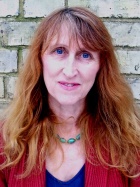How did you come to be an educational writer?
 While I was finishing my PhD, I ran out of money—as just about everyone does—and started writing some training materials for a local IT company to keep the wolf from the door. After I’d finished, I had an academic job just long enough to realize it wasn’t what I wanted to do and so went back to writing while teaching just on a freelance basis.
While I was finishing my PhD, I ran out of money—as just about everyone does—and started writing some training materials for a local IT company to keep the wolf from the door. After I’d finished, I had an academic job just long enough to realize it wasn’t what I wanted to do and so went back to writing while teaching just on a freelance basis.
I tried lots of types of writing: corporate newsletters, PR stuff, lifestyle journalism, courses, training materials, children’s non-fiction… I slowly dropped the bits I didn’t like and settled on children’s non-fiction (more and less educational—a mix) and children’s fiction. Later I added adult trade non-fiction, and that’s the mix I’ve stuck with.
What do you think are the necessary skills for writing educational books?
Excellent research skills, an ability to find the interesting bits in absolutely anything, and a real desire to share and explain. It’s a bit like being a child who finds a shiny stone and wants to show it to everyone. ‘Hey, look at this: it’s so COOL!’ But you can’t fake that enthusiasm. Most adults will shrug and look away, but pick the right stone and children will be fascinated by it.
Tell us about your typical working day.
At the moment my working pattern is dictated by domestic responsibilities so it goes rather like this: get up about 6, make coffee, work until my grand-daughter comes to hassle me, take her to nursery and her mum to college or hospital (she’s a trainee midwife), go to the University Library and, um, have breakfast and coffee in the tea room while messing about online, then work until their day has ended, and pick them both up. I work a bit longer at home if it was an early finish (pick up at 4), but not usually if it was a late finish (pick up at 6). Especially if it’s a week of early pick-ups, I often work one full- or two-half days at the weekend, too—frequently in the library or a café to be out of range of random requests.
What do you enjoy the most about your work?
Learning about new topics and working out how to present difficult material in an accessible and exciting way. I usually only turn down a project if I’m not sufficiently interested or excited by the subject. If I’m not excited by it, I won’t make anyone else excited. So I don’t write about sport or celebrities. And I don’t write about music because I don’t know enough and plenty of other people do.
What, in your view, are the specific challenges for educational writers, and what can be done to address them?
Oh, that’s hard! One challenge is to be seen as a ‘real’ writer in a world that thinks ‘writer’ means ‘novelist’. We are virtually invisible to the public, at least in the UK. People who aspire to be a writer don’t even think about educational writing. It’s just not on anyone’s radar. Consequently, and perhaps also because we tend to write in a lot of different areas, we tend to have little public profile.
That makes any kind of personal marketing or ‘brand-building’ quite hard, and that in turn leads publishers to see us as a general commodity rather than talented individuals with discrete areas of expertise. Commercially, the main challenge is that publishers are less and less willing to pay a fair rate for the amount of time they expect to be devoted to a project. I suspect they actually have no idea how much time a project will take, and even if they do they have no understanding of the economics of freelance work. I read recently that one publisher is making a real push to encourage its non-fiction writers to do more in-depth research—but you can be pretty sure they won’t be paying them more!
Bearing in mind the recent refocusing of the Group, what would you like to achieve as Chair over the coming year?
I hope we can forge a robust identity for educational writers that will enable all of us to feel we have a presence, a purpose and a legitimate place in publishing. At the moment, it’s easy to feel (and probably be) sidelined and just part of a small group. But actually most published writing is non-fiction and a lot of it is educational. Educational writing is at the very heart of education and is vital to the publishing economy, but you never see any recognition of that. Let’s try to change it!